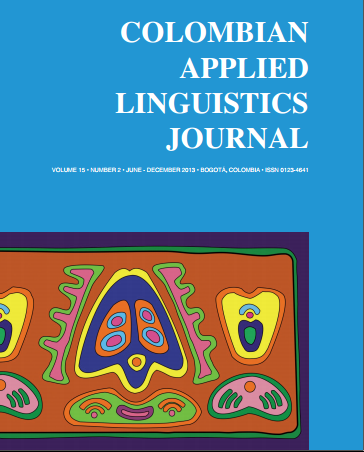DOI:
https://doi.org/10.14483/udistrital.jour.calj.2013.2.a010Publicado:
2013-07-01Número:
Vol 15, No 2 (2013) July-DecemberSección:
Reflexiones sobre la prácticaThe componential analysis of literary meaning
El análisis componencial del significado literario
Palabras clave:
análisis componencial, decomposición, significado literario (es).Palabras clave:
componential analysis, decomposition, literary meaning (en).Descargas
Resumen (en)
The present paper aims at showing the importance of understanding English literary texts via the semantic analysis. Understanding literature as being a specific and more or less decompostional language is to rely on a lexico-semantic interaction which establishes meaning from different relations between words’ components because the latter hold meaning not clearly seen in the words of the text. The semantic analysis of literary texts enables the reader to establish a network of relations between terms and settles on a meaning that other semantic theories may not reach. This research provides a semantic analysis based on the lexical decomposition of the word into major and minor components whose semantic interaction yields meaning systematically. The application of the componential analysis on English literary texts can establish a lexical interaction based on semantic interrelations between words at the deep level because the minor components are not seen at the surface level. The interrelations between components can therefore yield the meaning enclosed at the surface level. The componential analysis is a way to getting into the deep surface structure of words through establishing semantic interrelations between words. This task enables the reader to find meaning in the possible components words may have, and makes him/her checking it by logical inference that stands primarily on the utterance as source of meaning projection.
Resumen (es)
En este artículo se plantea la importancia de la comprensión de los textos literarios ingleses a través del análisis semántico. Entender la especificidad de la lengua literaria basada en una interacción léxico- semántico que establece relaciones semánticas entre las palabras y sus componentes ya que el significado de este último no siempre está claro en el texto. El análisis semántico de textos literarios permite al lector a establecer una red de relaciones entre los términos. Esta investigación ofrece un análisis semántico basado en la descomposición de la palabra léxica con los componentes principales y secundarias de su interacción semántica tuve la sensación de forma sistemática. La aplicación de los análisis de la composición de textos literarios ingleses podrá establecer una interacción léxica basada en las relaciones semánticas entre las palabras del nivel más profundo, porque los componentes de menor importancia no son visibles en la superficie. Por las tantas interrelaciones, léxicas pueden dar significado implícito en la superficie. Análisis de la composición es una manera de entrar en la estructura de la palabra de la superficie a la profundidad a través de la semántica interrelacionarle. Esta tarea permite al lector encontrar significado en las palabras posibles que pueden tener componentes, y permitir al lector para verificar la deducción lógica que se encuentra principalmente en el estado es una fuente de proyección semántica.
Referencias
Birch, D. (1989).Language, Literature and Critical Practice: Ways of Analysing Text.London: Routledge.
Carter, R. (1998). Vocabulary: applied linguistic perspectives. London: Routledge.
Cruse, A. (1986).Lexical semantics.Cambridge: Cambridge University Press.
Culler, J. (2002). Structuralist Poetics: Structuralism,
Linguistics and the Study of Literature. London:
Routledge.
Fish, S. (1980). Literature in the reader: affective stylistics.
In J.P. Tompkins (Eds.) Reader-Response Criticism:
From Formalism to Post-Structuralism(p. 70-100).
Baltimore: JHU Press.
Griffiths, P. (2006). An introduction to English semantics
and pragmatics. Edinburg: Edinburg University
Press.
Halliday, M.A.K. (2006). Linguistic Studies of Text and
Discourse. London: Continuum International Publishing Group.
Kempson M. (1977). Semantic theory.Cambridge: Cambridge University Press.
Martin, T. (2004). Poiesis and Possible Worlds: A Study
in Modality and Literary Theory. Toronto: University
of Toronto Press.
Ronen, R. (1994).Possible Worlds in Literary.Cambridge
:Cambridge University Press.
Todorov, T. (1981).Introduction to Poetics.Minnesota :
U of Minnesota Press.
Violi, P. (2001). Meaning and experience.Indiana: Indiana
University Press.
Widdowson, H. (1975). Stylistics and the teaching of
literature.Harlow: Longman.
Widdowson, H. (1980). Stylistic analysis and literary
interpretation.In M. Ching, M. Haley & R. Lunsford
(Eds.), Linguistic perspectives on literature (pp. 235-241). London:Routledge & Kegan Paul.
Cómo citar
APA
ACM
ACS
ABNT
Chicago
Harvard
IEEE
MLA
Turabian
Vancouver
Descargar cita
Métricas
Licencia
Esta publicación tiene licencia de Creative Commons Reconocimiento-No comercial- Sin obras derivadas 2.5 Colombia. El lector podrá leer, copiar y distribuir los contenidos de esta publicación bajo los términos legales de Creative Commons, Colombia.
Para mayor información referirse a http://creativecommons.org/licenses/by-nc-nd/2.5/co/








